REMEMBERING THE DECEASED
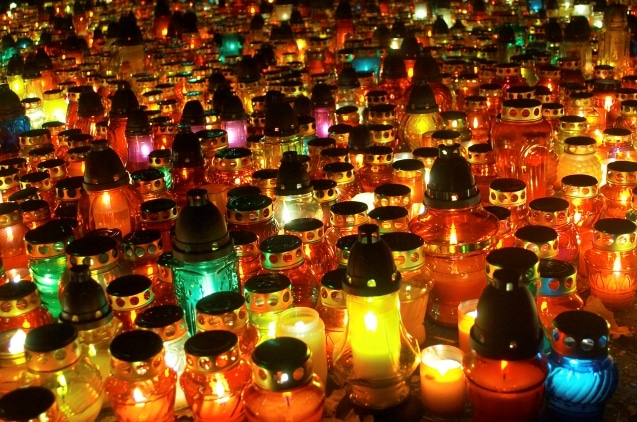
It is a time of the year where the fields have been harvested and sacrifices of animals and even humans were made to the gods to thank for good crops. Often we link death to events such as Halloween, or All Saints Day. But have you ever wondered why? Let’s look at some of the ways in which death is celebrated or remembered.
Halloween
Halloween is recognised as falling on October the 31st, the eve of the Western Christian feast of All Hallows. In fact Halloween comes from the phrase All Hallows Even. It brings together the traditional celebrations of the pagan harvest festival and festivals to honour the dead. It is linked to the Celtic festival of Samhain, meaning summers end.
We recognise this time of year by getting the children to go ‘Trick or Treating’ their neighbours in the village and town. People often dress up as creatures of the night, ghosts or zombies. Pumpkins are hollowed out and a candle is placed inside. Faces are then carved into the pumpkins and the lanterns are paraded in the streets, or placed outside the house or in windows. Some will light bonfires or play tricks on each other and maybe tell a ghost story or two.
to be harvested – betakarítva, learatva lenni
sacrifice – áldozat
crop – termés
to link – összekötni, összekapcsolni
to wonder – elmélkedni, gondolkodni
to celebrate – ünnepelni
to remember – emlékezni
to be recognised as – valamiként (el)ismert
to fall on – valamikorra esik (nap)
eve – ünnep előestéje
feast – ünnep(nap)
in fact – valójában
phrase – mondás, szólás, mondat
to bring together – összehozni
pagan – pogány
harvest – aratás, betakaítás
to honour – tisztelni, becsülni
to dress up as – beöltözni valaminek
creature – teremtmény
pumpkin – sütőtök
to be hollowed out – üreget vájni
to carve – faragni
lantern – lámpás
to be paraded – körbehordozva, mutogatva lenni
to light a bonfire – örömtüzet, máglyát gyújtani
to play tricks on somebody – valakit megtréfálni, átverni
All Souls Day
This day remembers those who have departed this world. All Souls Day is just a few days after Halloween and falls on November 2nd. All Souls Day is mainly observed by the Catholic Church, but other religions also recognise its tradition. Its official name is The Commemoration of All the Faithfull Departed but also known as the Feast of All Souls and even in some languages as Day of the Dead.
All Saints Day
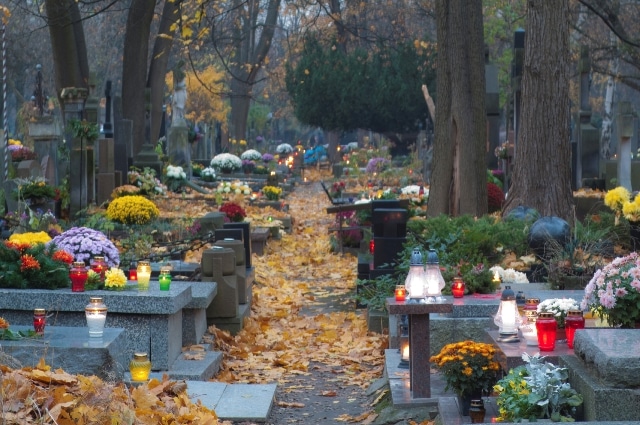
Like All Souls Day, it is a time to remember those who have died. All Saints Day is celebrated on the first Sunday after Pentecost or in some religions on the 1st of November. This day commemorated those who have attained sainthood, and can be traced back to the year 609 at the time that Pope Boniface IV consecrated the Pantheon in Rome to the Blessed Virgin and the Martyrs. This day is also observed by the church as a holiday.
to depart – elhalálozik, elhuny
to observe – ünnepet, szokást megtartani
religion – vallás
commemoration – megemlékezés
Pope – pápa
to be consecrated – felszentelve lenni
blessed – áldott, szent
virgin – szűz
martyr – mártír
holiday – itt ünnep
Day of the Dead
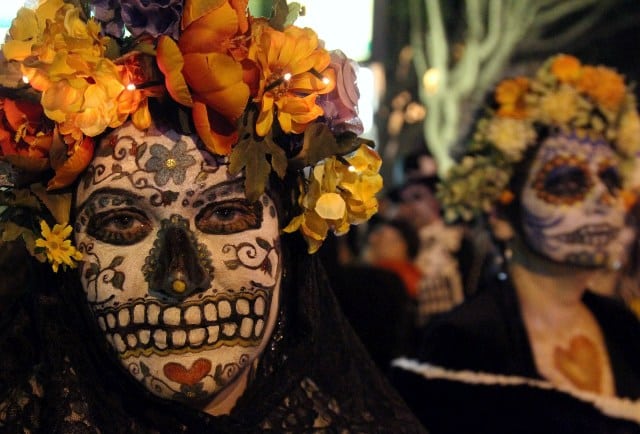
It may seem like a title to a horror film, but in fact Day of the Dead is a day that actually remembers and celebrates the life and death of people. In Mexico, this day falls on the same day as All Saints Day and the Mexicans remember deceased children and infants. It is also a national holiday. The dead will be honoured by presenting sugar skulls and marigold flowers along with some of the favourite foods and drinks of those who have died. These will be left at the graves as gifts.
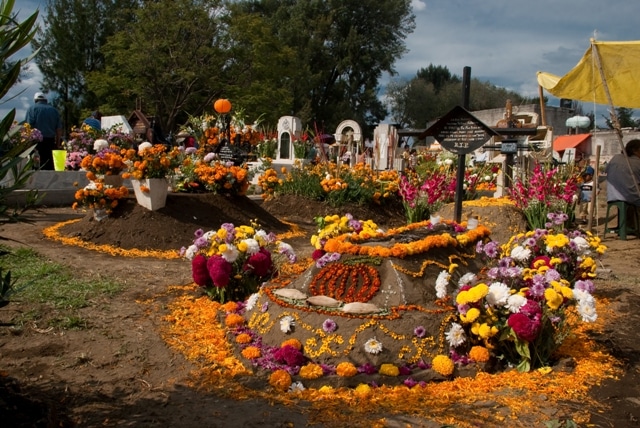
It is believed that this celebration dates back to Aztec festivals, many hundreds of years ago, and is dedicated to an Aztec goddess called Mictecacihuatl. Day of the Dead is also celebrated in Brazil and Spain where people gather in cemeteries and pray for those who have passed away.
title – cím
infant – csecsemő
national holiday – nemzeti ünnep
to be honoured by – kitüntetve, megtisztelve lenni
skull – koponya
marigold flower – körömvirág
along with – valamivel együtt
grave – sírhely
it is believed – azt hiszik, az a hiedelem
to date back – visszanyúlik időben
to be dedicated to – valaminek szentelve lenni
to gather – összegyűlni
cemetery – temető
to pray – imádkozni
to pass away – elhunyni
Bon Festival
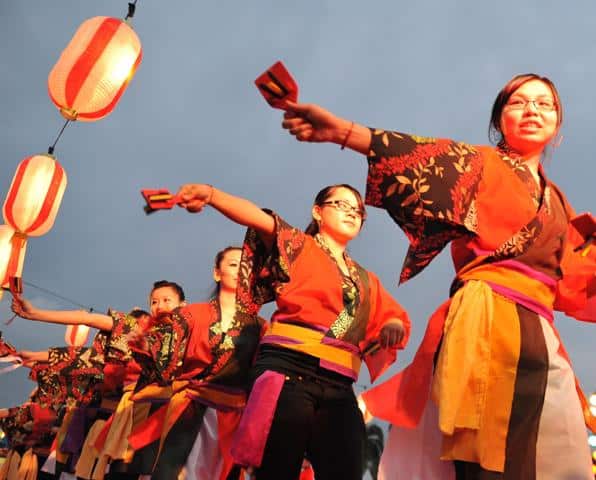
This is an ancient Japanese Buddhist custom, known also as Obon or simply just Bon. This is a time to remember the dead and also to remember their spirit. In Japan it is a time to family reunions and this time is used to remember ancestors with prayer. Graves are attended and cleaned by members of the family. The tradition dates back for more than 500 years ago and amongst the celebrations there is also a traditional dance called Bon Odori.
As this is a festival time it lasts generally for around three days and takes place in summer, usually in July or August, depending on where in Japan you live. The festival ends with lanterns floated in rivers or lakes to remember ancestral spirits and the celebrations usually end with a huge fireworks display.
Ghost Festival
This is a tradition from China, where it is also known as the Hungry Ghost Festival. This time is also recognised as a holiday by the Chinese in many countries. July 15th is regarded as Ghost Day and July Ghost Month. It’s believed in tradition that this day the spirits of ancestors reveal themselves, a day when the deceased visit the living. Food is offered to the spirits, meals are served to empty seats where ancestors and family once sat and lanterns are burnt and released onto water as a way of giving direction to lost spirits and also paying their respect to their memories. The Ghost festival is also celebrated in Singapore and Malaysia.
ancient – nagyon régi, ókori
custom – szokás
to be known as – úgy ismert, mint
spirit – szellem, lélek
family reunion – családi összejövetel
ancestor – ős, előd
prayer – imádság, ima
to be attended – meglátogatva lenni
to last – tart (időben)
to take place – megrendezik
to depend on – valamitől függ
to float – lebeg, vízen úszik, úsztat
ancestral spirit – ősi szellemek, lelkek
to reveal oneself – megjelenik, megmutatja magát
to be offered – felajánlva lenni
to be served – felszolgálva lenni
to be burnt – elégetve lenni
to release – kiadni, elengedni
to give direction to – irányt, utat mutat
to pay one’s respect to – lerója a tiszteletét
Normal
0
false
false
false
EN-GB
X-NONE
X-NONE
/* Style Definitions */
table.MsoNormalTable
{mso-style-name:”Table Normal”;
mso-tstyle-rowband-size:0;
mso-tstyle-colband-size:0;
mso-style-noshow:yes;
mso-style-priority:99;
mso-style-parent:””;
mso-padding-alt:0cm 5.4pt 0cm 5.4pt;
mso-para-margin-top:0cm;
mso-para-margin-right:0cm;
mso-para-margin-bottom:10.0pt;
mso-para-margin-left:0cm;
line-height:115%;
mso-pagination:widow-orphan;
font-size:11.0pt;
font-family:”Calibri”,”sans-serif”;
mso-ascii-font-family:Calibri;
mso-ascii-theme-font:minor-latin;
mso-hansi-font-family:Calibri;
mso-hansi-theme-font:minor-latin;
mso-fareast-language:EN-US;}


